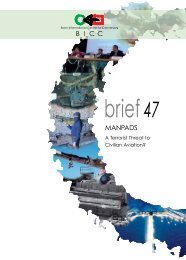egypt-final-presidential-elections-2012
egypt-final-presidential-elections-2012
egypt-final-presidential-elections-2012
Create successful ePaper yourself
Turn your PDF publications into a flip-book with our unique Google optimized e-Paper software.
The Carter Center<br />
Presidential Election in Egypt<br />
subject to an inclusive, transparent consultation<br />
process and promulgated by a democratically<br />
elected parliament.<br />
6b. Ensure that the electoral legal framework is<br />
clear and complete.<br />
The current legal framework includes some terms<br />
and concepts that are undefined. For example,<br />
candidates and parties are prohibited from using<br />
“religious slogans” in campaigning, but there is<br />
no clear definition of what constitutes a “religious<br />
slogan.” The Carter Center recommends that<br />
lawmakers consider defining vague terms both<br />
within the laws themselves and as part of training<br />
and other education materials for use by election<br />
officials, voters and other electoral actors.<br />
Additionally, the current electoral legal<br />
framework fails to address some important issues,<br />
creating confusion and inconsistent practices<br />
among electoral administrators and other stakeholders.<br />
For example, there is no language in any<br />
of the electoral laws explicitly addressing the assistance<br />
of illiterate voters. Electoral administrators<br />
took inconsistent approaches to assisting illiterate<br />
voters in polling stations. Some refused to provide<br />
assistance; others provided varying levels of<br />
assistance. The Carter Center recommends that<br />
lawmakers work with election administrators and<br />
other stakeholders to address gaps such as these in<br />
future iterations of the electoral legal framework.<br />
7. Consolidate and clarify an impartial, efficient,<br />
and transparent electoral dispute resolution<br />
system to handle all appeals and complaints,<br />
including postelectoral appeals.<br />
The Carter Center recommends that Egypt establishes<br />
a single, unified process for filing all electoral<br />
complaints (either with a permanent EMB or<br />
directly with the courts), possibly through the use<br />
of a standardized complaint form available online<br />
and at multiple locations throughout the country.<br />
Overall, in order to ensure that all Egyptians have<br />
confidence in the electoral complaints system, and<br />
the opportunity to seek redress of election-related<br />
complaints, it is essential that the EMB and<br />
court decisions and actions to address complaints<br />
are clearly explained, written and recorded, and<br />
thoroughly publicized. In addition, the EMB<br />
should clearly and effectively educate voters and<br />
other electoral stakeholders about how the process<br />
works and why it is important to file a complaint<br />
if one has witnessed electoral misconduct.<br />
To enable a more thorough review of postelectoral<br />
appeals, The Carter Center recommends<br />
that lawmakers consider extending the deadline<br />
for decisions on postelectoral appeals to two or<br />
three days after candidates file their appeals with<br />
the electoral management body. The Carter<br />
Center also urges the PEC to publish <strong>final</strong><br />
polling-station-level results via its website at<br />
the earliest possible opportunity to reinforce the<br />
transparency of the electoral dispute resolution<br />
process, accounting for changes in vote totals<br />
based on the adjudication of electoral complaints.<br />
8. Eliminate mandatory sanctions for failure<br />
to vote.<br />
Voting is mandatory in Egypt. During the <strong>presidential</strong><br />
election, Egyptian law stated that a failure<br />
to vote carried with it a fine of up to 100 Egyptian<br />
pounds (approximately U.S. $17). While The<br />
Carter Center is unaware of any fines having been<br />
levied against any of the millions of Egyptians<br />
who chose not to vote, these fines are both unreasonably<br />
high and do not have the desired effect of<br />
ensuring voter turnout. Particularly in the absence<br />
of a comprehensive, rigorous program of voter<br />
education, The Carter Center suggests that these<br />
fines be eliminated.<br />
To the Presidential Election<br />
Commission<br />
9. Take steps to ensure and enhance the integrity<br />
of the voter registration process.<br />
The process of voter registration is a critical<br />
means of ensuring the enfranchisement of eligible<br />
voters and the integrity of an election. In the<br />
69



